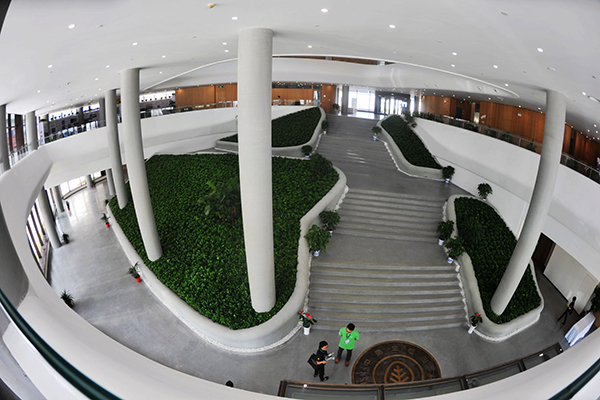 |
|
Interior of a passive house in Qingdao, Shandong province, Aug 11, 2016. [Photo provided to China Daily] |
Qingdao-based Sino-German Ecopark, the only strategic cooperation park in China between the Chinese and German governments, has been pushing forward the standardization of energy-saving buildings domestically and internationally.
The effort was widely recognized by worldwide architectural experts and industry insiders after a new passive house experience center became operational at the park late last week.
A passive house is a method of construction that employs rigorous standards for energy efficiency, while seeking to reduce a building's ecological footprint.
"As the only demonstration park of international standards cooperation approved by the Standardization Administration of China, the park has set up 40 quantifiable eco-indicators, some of which are put forward for the first time in China," said Yu Zhengjie, deputy general manager of Sino-German United Group, which is in charge of the passive house project in the park.
The functionality of the new building has been tested by Passive House Institute in German. The results showed that all of the indicators met PHI standards, the strictest and the most authoritative of their kind in the world.
The green building will save operating costs of as much as 500,000 yuan ($75,075) and reduce carbon emissions by 664 metric tons annually.
According to research, if 20 percent of new buildings met the passive house standard in China, carbon emissions would be reduced by 12 million tons. If only 5 percent of existing buildings were renovated on the basis of the passive house standard, carbon emissions would be cut by 60 million tons.
In Qingdao, Shandong province, there are many market players like Sino-German Park that value high standards.
Li Qun, Party chief of Qingdao, said there is a close connection between Qingdao and standardization, which originates from the city's industrial heritage and is also based on the openness of the city.
The coastal city recently formulated the Indicator System of the Global City Strategy of Qingdao with reference to 10 global cities including Hong Kong, Singapore and San Francisco.
"The system contains five primary indicators and 35 secondary indicators, such as international competitiveness, international influence, international capacity for growth and international appeal, all of which aim to drive the city's opening up and development with international standards," Li said in his keynote speech at the 39th General Assembly of the International Organization for Standardization held in Beijing on Sept 14.
Qingdao-based Haier Group, one of the world's biggest home appliance suppliers, has made more than 90 proposals for international standards.
In 2015, Qingdao became the first city to announce the "Standardization Plus" city development strategy, and signed the MOU on Developing an Innovative City in Standard Internationalization with the Standardization Administration of China.
Now, Qingdao is leading or has been involved in the formulation and revision of 74 international standards, more than 650 national standards, and over 700 industry-specific standards.
Li said Qingdao will take an active part in international standardization affairs and set up more platforms including Qingdao International Standard Information Center, Training Center for Standardization Professionals, and Research Center for Internationalization of Standards.
"We have reached an agreement with the Standardization Administration of China to organize the International Standardization Forum every May or June from next year," Li added.
